Stay in the know on all smart updates of your favorite topics.
🚨 𝗪𝗲'𝗿𝗲 𝗮𝗹𝗿𝗲𝗮𝗱𝘆 𝗮𝘁 𝟱𝟬% – 𝗮𝗻𝗱 𝘄𝗲 𝗵𝗮𝘃𝗲𝗻'𝘁 𝗲𝘃𝗲𝗻 𝗸𝗶𝗰𝗸𝗲𝗱 𝗼𝗳𝗳 𝘆𝗲𝘁! 🚨
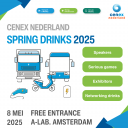
Wow! Half of the tickets for our Cenex Nederland Lenteborrel have already been ordered – and the event isn’t even happening until 8th of May 2025. 🎉
That means: lots of excitement, high expectations, and... an opportunity you don’t want to miss.
The event will be focusing on Transport & Mobility, Circular Mobility, Energy & Infrastructure, where you can expect the following.
📍 What to expect:
✅ Meet exhibitors and explore the latest innovations
🎮 Join or watch two exciting serious game sessions
🎤 Be inspired by four engaging keynotes (English)
🥂 End the day with our annual spring reception where you have the opportunity to network.
Want to join us? Don’t wait too long – the remaining 50% is likely to go even faster. 🎫
Please make sure to get your (free) ticket via Eventbrite
Open call: 54 tech-for-good challenges with funding available for over 60 pilots

CommuniCity's third Open Call is now launched! 🚀
We are pleased to launch the final CommuniCity Open Call round. There will be over 60 pilots running across Europe, focusing on digital inclusion and wellbeing for marginalized communities. 7 challenges are focused on citizens of Amsterdam.
In addition to the partner cities of Helsinki, Porto, and Amsterdam, the Replicator Cities are also presenting their unique challenges. The Replicator Cities are Aarhus, Bruges, Brussels, Cuneo, London, Manchester, Matosinhos, Milazzo, Plock, Prague, Sant Boi de Llobregat, Sarajevo, The Hague and Utrecht.
💡 Tech providers: Apply for grants of up to €12,500 to develop tech solutions and run real-life experiments in collaboration with the cities. The deadline for applications is October 31st, 5pm CET.
More information on the Open Call: https://lnkd.in/e-Z5EA5z
Let’s shape the future of our cities together! 💪
Leer, werk, beleef hoe Ai de stad kan veranderen | Kom naar Ai in de Stad
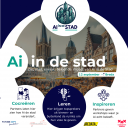
Leer, werk, beleef hoe Ai de stad kan veranderen
Op 12 september brengen we Ai in de Stad. In Breda, de stad die een van de voorlopers is op smartcitygebied in Nederland en daar in 2023 met een Smart City Award voor werd beloond. Maar ook de stad met een Ai-opleiding, een sterke techsector en een leidende positie in de gaming-industrie. We organiseren een congres dat laat zien hoe Ai de stad kan veranderen en wat daarvan de kansen en bedreigingen zijn.
Ai kan onze steden tot leven brengen. Kunstmatige intelligentie belooft dat auto’s autonoom rijden, professionals in het sociaal domein worden ondersteund in het nemen van beslissingen, veiligheidsrisico’s beter worden ingeschat en gebouwen veel efficiënter gebruikmaken van energie. En vast nog veel meer. Maar als dat allemaal samen komt lijkt het erop dat de stad op haar gebruikers gaat reageren. De tijd van stenen steden is voorbij. De stad van de toekomst communiceert met ons, reageert op ons, leeft met ons.
Dat biedt enorme kansen in het fysiek en sociaal domein en op het gebied van veiligheid. Het geeft Nederlandse bedrijven grote kansen. Want wat zijn de ethische consequenties van Ai? Hoe borgen we onze democratische rechtstaat in een zelfdenkende stad? Hoe afhankelijk maken we ons van de techniek? En worden steden geen eenheidsworst als ze allemaal dezelfde Ai gebruiken?
Dat vraagt het om kennis van de techniek en de toepassing daarvan. Zodat je kan onderscheiden wat echt is en wat niet. Waar de verandering ophoudt en de fantasie begint. Er zijn dus genoeg vragen om van te leren, genoeg voorbeelden om te zien en genoeg oplossingen om toe te passen en te beleven.
Daarover gaat het jaarlijks terugkerende event Ai in de Stad dat we op 12 september in Breda organiseren. Tijdens het congres kunt u leren in lectures, zelf aan de slag tijdens workshops en zien en beleven in de innovatie-expo.
Het conceptprogramma zien? Kijk het hier: https://aiindestad.nl/congres/
We presenteren daarbij toonaangevende sprekers uit binnen- en buitenland, mindblowing ervaringen en kleinschalige leerervaringen. We focussen op de thema’s: De leefbare en duurzame stad, de veilige stad, de sociale en gezonde stad en economie en cultuur in de stad. En op de rode draden: ethiek & burgerschap, techniek en cultuur.
En om de verbeelding helemaal de ruimte te geven, organiseren we ’s avonds een filmfestival over Ai in de Stad in het filmhuis van Breda. Met een diner vooraf en een inleiding op Ai in films.
Dit doen we samen… De gemeente Breda en de Future City Foundation hebben elkaar gevonden in de fascinatie voor de kansen van Ai in de Stad. Maar willen ook begrijpen wat de bedreigingen zijn.
Maar we doen dat niet alleen. We zijn trots op en blij met de partners die ons hierin ondersteunen. Zoals Scape Agency, Ai for Good, ELBA\REC en mediapartner Stadszaken.
Wanneer, hoe, wat
Wanneer: 12 september 2024
Waar: Breda (verschillende locaties in de binnenstad)
Entree: Het evenement is gratis toegankelijk.
Kun je toch niet, meld je af: Soms komt er iets tussen en kun je toch niet naar een event waar je graag heen wilde. Dat kan gebeuren. Maar als wij dat niet tijdig weten, kopen we eten in dat we daarna moeten weggooien. Dat vinden we zonde. Daarom vragen we je dat als dit onverhoopt voorkomt, je uiterlijk 7 dagen voor het event af te melden bij Naomi Vrielink (naomi@future-city.nl). Doe je dat niet, dan wordt er 75 euro in rekening gebracht.
Meld je hieronder aan:
Public Mobility: an integrated vision on how public transport and shared mobility should work in Noord-Holland

News from the Province Noord-Holland, the Netherlands
Mobility is a necessity for everybody, to be able to work, shop, recreate, visit friends and family, etc. For those who cannot or do not want to use their own means of transport, the province Noord-Holland recemtly adopted a new vision on Public Mobility. This vision aims to make better and affordable public transport possible, also in small towns. How? By making it easier to switch between different modalities. And by offering sustainable, inclusive mobility without using your own means of transport. This includes trains, buses and local buses, but also shared bicycles and shared cars. The province wants public mobility to be well organized everywhere in the province. This is not about more public transport, but about better public transport. It is important that the entire (chain) journey from door to door works well, including:
the train, pre- and post-transport, shared mobility and regional public transport of the Transport Region and surrounding provinces.
Discover here how this system contributes to accessible and future-proof mobility for everyone: 👉https://lnkd.in/e6NeumeZ
Or watch the animation: 👉https://lnkd.in/eTWv3kXw
My highlights from the exchange between the Province of North-Holland and Baden-Württemberg
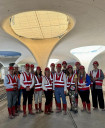
On May 17 and 18, I had the honour to join regional minister Olthoff from the Province of North Holland on a mission to Stuttgart, Baden-Württemberg. We went there to exchange experiences and learn from each other especially in the field of smart mobility.
After a nice train ride of no longer than 6 hours, we arrived in Stuttgart. We started our trip with a visit to ArenA2036 and Plug and Play Techcenter. A state-of-the-art research campus connected to a startup accelerator. Sascha Karimpour, director of Plug and Play, enthusiastically introduced us to their startup accelerator. He told us how they bring research and industries together and find efficient ways to collaborate with startups.
“To keep it exciting we constantly have to change. The major challenge now is not only matching start-ups and companies but also putting a lot of effort in stakeholder management, because if you don’t do that it will fall apart” - Sascha Karimpour.
In the research lab of ArenA2036 we saw amazing technologies come to life. From smart floors to highly advanced robotica and intralogistics; optimizing human and robot logistics in production. Peter Froeschle, CEO of ArenA2036, showed us around.
“Bringing all disciplines together increases creativity. But building an innovation platform is much more than just providing the facility. You need to keep the fire burning.” – Peter Froeschle.
In the afternoon, we had an official exchange with Verband Region Stuttgart. Here we learned that the Province of North Holland and Baden- Württemberg face a lot of the same mobility challenges. Similar to the Province of North-Holland, the interaction between urban and rural areas is important in Baden- Württemberg. We visited their innovative mobility hub concept. With standard services like the bus, taxi, P&R, bike & ride, but also an Information Terminal and 24/7 Info hotline, bike service station and kiosk.
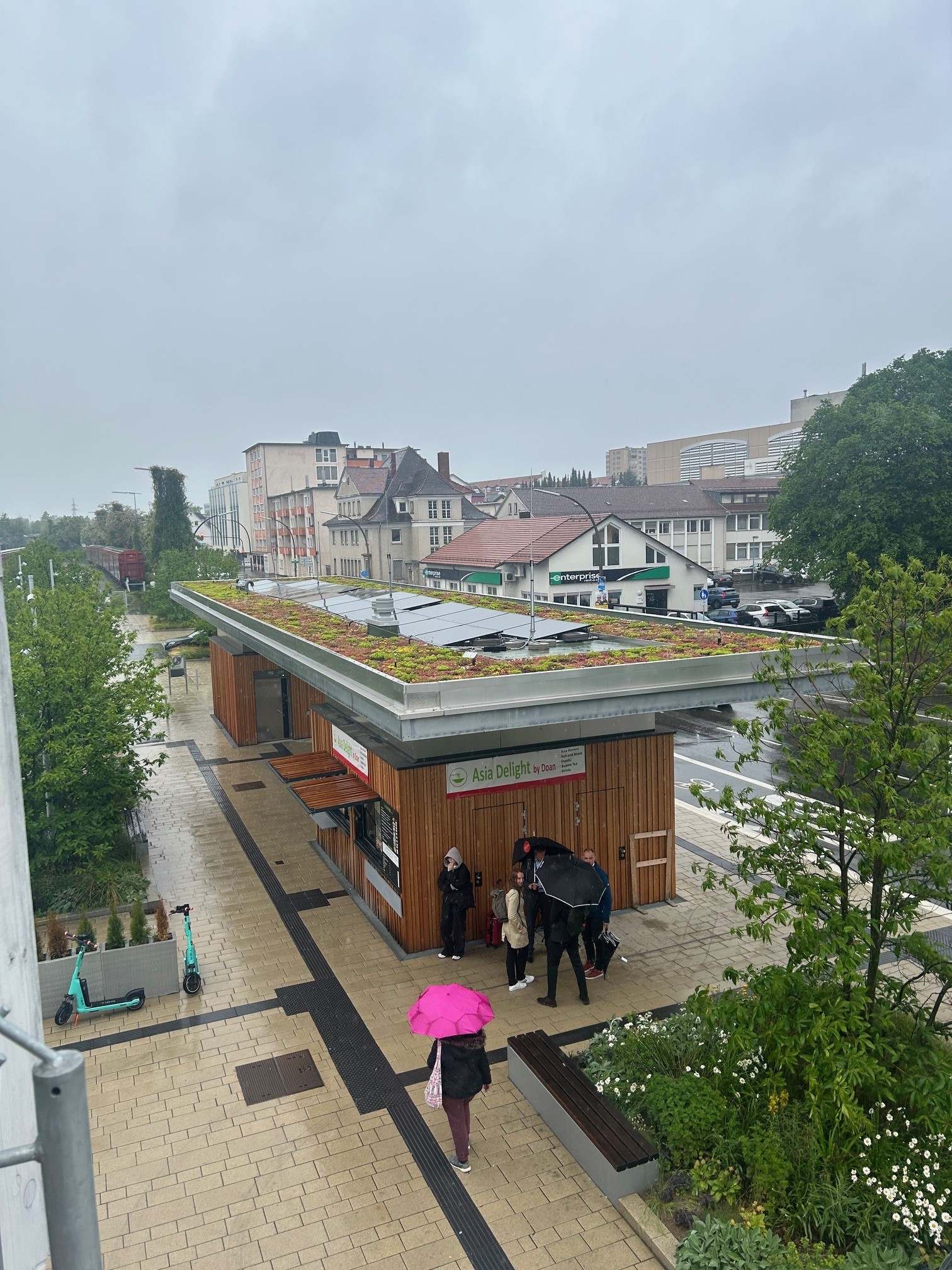
Afterwards, we visited the construction site of Stuttgart 21, a large fully underground train station and 60km tunnel - a highlight of the trip! The impressive station is designed by the architect Ingenhoven. The prestigious design is characterised by its huge concrete pillars and a glass roofs providing light. A very controversial project which in the end was voted for in a referendum with 57% of the votes. By building the train station underground, public space in the city center will be freed up for housing. Take a look yourself at this unique project.
The next morning, we continued the knowledge exchange with the ministry of Transport of Baden- Württemberg. We learned a lot from their ambitious plans. State secretary of Transport Zimmer presented us the ambitious plans of Baden- Württemberg. Their goal is to be climate neutral in 2040, which is 10 years earlier than the EU ambitions. They really aim to be the frontrunner. Inspiring financing tools like a Mobility Pass and a Mobility Guarantee were presented. As well as diverse modalities of Mobility on Demand in more remote locations.
All in all, it was a very inspiring trip! We learned a lot and strengthened the ties with the Baden- Württemberg region.
Demoday #23: Mobility Injustices and the creative mind.
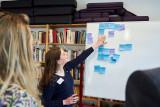
In a world where moving yourself from point A to point B is becoming much more crucial than ever, there are people out there who cannot experience such a luxury at the flick of a wrist, or perhaps the clack of an ankle? It is hard to imagine sometimes, but there are those who cannot move around as easily as others; be it because of financial, physical, vehicular, or other reasons. A community that can go about as they please without any issues is a happy community that is beneficial to society – For a collective of governments and businesses it is in their best interests to ensure citizens can experience freedom and liberty in their mobility. The question of how to achieve this freedom in mobility and how to deter against injustices regarding mobility remains a hot topic, however. On behalf of Provincie Noord Holland and in collaboration with Amsterdam Smart City and Amsterdam Centre of Expertise, a group of graduating students tackled this topic on the latest Demoday of 2024.
Starting the voyage : What are mobility injustices?
A value workshop led by Jackie Ippel and Jade Salomons engaged the participants in a fun, creative wave of brain-crackling activities. Participants were presented with a question of whether they knew what mobility injustices, or as we call it in Dutch “Mobiliteits Armoede”, was. An explanation of which followed suit soon after. Mobility Injustices, as described by the KiM organization, explains the inability or difficulties people experience in terms of reaching activity locations due to inadequate transport options, combined with socio-economic and spatial conditions in which people find themselves. As a result, they are often hindered in their participation in social life, which negatively affects their quality of life.
It is important to think about the definition of what exactly mobility injustices entail, as it helps us find a better understanding in finding a creative series of solutions that will solve this complex jigsaw puzzle.
Like a ball of yarn : unraveling theorems.
In order to stimulate the brain of each participant and to get the blood pumping through their legs, each participant was asked to stand in the middle of the room. As was once quoted in the horror thriller Saw; “Wanna play a game?”. Participants were presented with a series of theorems in which they had to make a choice that’d question their liberal thoughts; either stand on one side of the room for one answer or on the other side for the other – No in-betweens. Being forced to make ultimatums proved to be both challenging for the participants yet fun, as it was met with bountiful heaps of enthusiasm. In the first theorem, participants were presented with a question of whether or not mobility should be a fundamental right for each and every citizen. While agreed one did not, but can their minds be changed? A flurry of other theorems were presented, each of which dove deeper into the depths of dilemmas one may encounter when attempting to solve the puzzle of mobility inequality. Like who is more important, those who have low incomes or those who suffer from physical and mental disabilities which hinder their day-to-day lives? Brief discussions flowed forth after each and every theorem, after each voting round, reasons were given as to why one can choose one over the other. After which another second voting session followed. Perhaps new insights would change one’s opinion on the subject? It actually did once or twice! Such is the power of dialogue.
Embarking into the abyss : Worst Idea Possible.
“How ba-a-a-ad can I be? I’m just doing what comes naturally-“ -such were the words Onceler sung in Dr. Seuss’s ‘The Lorax’. While people do not like the idea of being bad or thinking of bad ideas sometimes this way of thinking can actually bring plentiful new insights never thought of before. The group split itself in two, each of which under the guidance of either Jackie Ippel or Jade Salomons. Participants were asked to come with their most horrid, ludicrous ideas that’d actually make mobility injustices worse. After which they had to decide what element made this a bad idea. Example, if public transport were to be described, the element that’d make the idea bad would be less alternatives for traveling. The final and third part of this exercise required something rather unique however. Does your mind already wonder what? Well, it’s quite simple really, now participants had to come up with what would be the opposite of their bad idea! So what would their idea be in reverse, an actual solution to the problem they created. If your bad solution was to make everything only scannable by QR-codes its reverse solution would be… using solely physical text! For a solid 20 minutes participants racked their heads and discussed until their times were down to only 5 minutes left. The last of those minutes left were spent discussing and laughing about their ideas – A method met with confusion at first was appreciated with loads of enthusiasm by the end where only time was the fun killer.
A creative view found in madness: Crazy Eight.
The creativity cannot just end after one session. Holding the thought of the previous session, participants were asked to gather in a circle around a table. With each given a paper and asked to fold it so that 8 separate square spaces would form on the sheet the Crazy Eight exercise was explained. Participants were asked to draw their solution one of their 8 square. For each drawing they had a minute per square, a total of 8 minutes until all were filled. Of course with so little time there was little room for thinking, imagination had to pull the cart here, which led to both silly and unique drawings. The longer the session went on the more difficult it became – the participants were truly pushed to their creative limits. A well-trained eye could even notice how some participants still tried to finish their previous drawing before moving onto the next despite the time. You could feel the atmosphere in the room shift to a hectic, almost crazy aura, thus doing its name of ‘Crazy Eight’ truly justice.
At the end of the session it was only natural that people presented their top 3 drawings. One after another each participant proudly showed off their creative drawings like a trophy to the rest of the group. Turns out, despite not communicating with one another during the drawing sessions there were lots of similarities in the elements used in each drawing. The bus, the civil servant, and the elderly were commonly used elements seen back in almost everyone’s drawing. Via these sources of inspiration it became clear just where the solutions may lie.
An journey’s end : Results.
At the end of the session we didn’t just start talking about what we had done. No, instead we At the end of the session, we didn’t just start talking about what we had done. No, instead we went back and looked at the very first theorem everyone was presented with; “Should mobility be a fundamental right for each and every citizen?”. Last time everyone answered all but one was in favor of this theorem, now participants were asked to revise their statement and see if they still agreed with what they said at the beginning. As said before, dialogue can change the outlook we have on the world and so someone did change their stance – The one person that disagreed with the theorem now actually agreed that mobility should be a fundamental right. A full 100% score! Only after this a talk about what we had done started. Opinions were asked and each participant shared the emotion they had experienced during this work session and to leave it behind on a post-it.
· Fun and insightful: The gamification of thinking is taking the design world by storm, and on this Demoday, it has proven that this form of design thinking can not only be effective in bringing brand new insights but also can be fun.
· Enthusiasm: What started off with an iffy approach ended with tons of enthusiasm. Idea generating doesn’t just have to be sitting at a table and talking in your own bubble; it can become so much more effective when the mood is changed from serious and gloomy to frivolous and enthusiastic..
· Creativity: A creative way of thinking actually helps in generating ideas. Using playful thinking such as considering a bad idea first and then the opposite helps find solutions to problems in a much more efficient way.
During this Demoday, we as a group of graduating students got to know the thought process behind those who work within the field of mobility. While we hope that we brought them plenty of insights and, above all, a fun day, it is sufficient to say that we too learned an abundance of information. The insights made during the Demoday will be used by us in writing our final report for the Provincie Noord Holland regarding a detailed consult on how to improve the mobility of the citizens of the province of Noord-Holland and how to tackle the injustices surrounding mobility. Demoday’s are fun and can inspire even the most closed-minded people. If we could, we would do it all over again. And, if you are still on the fence about joining a Demoday, then I hope that column will ignite that curiosity.
Join AMS Institute's Scientific Conference, hosted by TU Delft, Wageningen University & Research, MIT and the City of Amsterdam.

Do you want to learn from and network with the best researchers and scientists working to tackle pressing urban challenges?
AMS Institute, is organizing the AMS Scientific Conference from April 23-25 at the Marineterrein, Amsterdam, to address pressing urban challenges. The event is organized in collaboration with the City of Amsterdam.
The conference brings together leading institutions in urban research and innovation, thought leaders, municipalities, researchers, and practitioners to explore innovative solutions for sustainable development in Amsterdam and other global cities.
Keynotes, research workshops, learning tracks, and special sessions will explore the latest papers in the fields of mobility, circularity, energy transition, climate adaptation, urban food systems, digitization, diversity, inclusion, living labs experimentation, and transdisciplinary research.
Attendees can expect to gain valuable insights into cutting-edge research and engage in meaningful discussions with leading experts in their field. You can see the full program and all available sessions here.
This year's theme is 'Blueprints for messy cities? Navigating the interplay of order and messiness'.
The program
Day 1: The good, the bad, and the ugly
Keynotes by Paul Behrens of Leiden University and Elin Andersdotter Fabre of UN-Habitat will be followed by a city panel including climate activist <strong>Hannah Prins</strong>. The first day concludes with a dinner at the Koepelkerk in Amsterdam: you're welcome to join our three-course meal with a 50 euro ticket.
Day 2️: Amazing discoveries
Keynotes by Carlo Ratti of MIT and Sacha Stolp of the Municipality of Amsterdam discuss innovation and research in cities. <strong>Corinne Vigreux</strong>, co-founder of TomTom, and Erik Versnel from Rabobank will participate in the city panel.
Day 3️: We are the city
Keynotes by Paul Chatterton of Leeds University and Victor Neequaye Kotey Deputy Director of the Waste Management Department of the Accra Metropolitan Assembly, Ghana. They discuss how we shape the future of our cities together. This will be followed by a city panel including Ria Braaf-Fränkel of WomenMakeTheCity and prof. dr. Aleid Brouwer of the Rijksuniversiteit Groningen.
To buy tickets: You can secure your conference tickets through our website.
Dinner tickets: On April 23 we’re hosting a dinner at the Koepelkerk in Amsterdam. Tickets for this can be added to your conference pass or bought separately.
Startup Hero Journey Program 2024
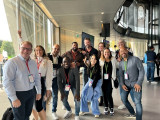
Join UPALMERE!'s Start-up Hero Journey 2024 and take your start-up to the next level.
Are you based in Almere or are you willing to settle there and are you willing to challenge yourself and investigate how your startup can contribute to a better world and thus scale internationally? Then this is your perfect opportunity to grow and realize your international ambitions.
The Startup Hero Journey program offers a series of inspiring sessions, masterclasses and events from late May to October that immerse you in the world of innovation and entrepreneurship. In our pre-accelerator program, you will not only develop your entrepreneurial potential under the guidance of experts and experienced mentors, but you will also discover new perspectives and join a network of like-minded entrepreneurs. Prepare for a journey that transforms your business and contributes to a more sustainable future.
Program in Dutch.
Exploring Smart Parking Solutions in Amsterdam: The Role of Mobypark in Shaping Urban Efficiency

The quest for parking in Amsterdam presents a unique set of challenges, including narrow lanes, constant vehicular flow, and strict parking policies. This iconic city, celebrated for its canal system, historical buildings, and cultural vibrancy, also faces the modern urban dilemma of parking scarcity. Amidst these challenges, Amsterdam's approach to parking, characterized by a zonal system with variable rates, mirrors its commitment to promoting sustainable urban mobility. Within the bustling heart of the city, parking fees can soar to €7.50 per hour, a pricing strategy designed to incentivize public transport and biking, cherished and eco-friendly travel methods among the locals.
Amsterdam's dynamic parking strategy also paves the way for innovative solutions like Mobypark, a platform revolutionizing parking by facilitating the rental of private parking spots. This initiative not only offers a cost-effective alternative to the traditional parking hunt but also optimizes the use of existing spaces, aligning with the city's sustainability goals.
For those seeking affordability without sacrificing convenience, Amsterdam's Park and Ride (P+R) facilities serve as a beacon. Strategically located at the city's periphery, these parking havens offer reduced rates, encouraging drivers to park their vehicles and hop on public transport to reach the city's core. This system significantly mitigates urban congestion and lowers parking costs for both tourists and daily commuters.
The allure of P+R locations is undeniable, especially when juxtaposed with the exorbitant costs of street parking. To access P+R discounts, users must integrate their parking with public transportation, highlighting the city's efforts to weave sustainability into the fabric of urban travel. Mobypark's P+R options stand out for their simplicity and affordability, offering seamless access to the city center without the usual prerequisites. Examples include:
Amsterdam's strategy to curtail on-street parking availability is a deliberate move towards fostering a more sustainable, pleasant cityscape. By endorsing alternatives like public transport, cycling, and Mobypark's innovative parking solutions, Amsterdam is making strides in reducing traffic jams, cutting down on pollution, and improving urban life quality. These initiatives are testament to Amsterdam's dedication to a sustainable future, highlighting Mobypark's pivotal role in transforming the city into a smarter, more navigable urban space.
Find a link to Mobypark here: Amsterdam parking
Doe mee aan de Green Innovation Hub contest!

In Almere en de provincie Flevoland vinden de grootste gebiedsontwikkelingen van Nederland plaats zoals Hortus, Pampus, Zuidoever. Om echt toekomstgericht te kunnen bouwen en als voorbeeld te dienen voor de rest van Nederland, organiseren zij de Green Innovation Hub contest ’24. In deze competitie worden organisaties uitgedaagd om met digitaal gedreven toepassingen te komen op het gebied van duurzame energie, mobiliteit of slim wonen.
Ben jij een start-up, scale-up of een innovatief kleinbedrijf (MKB), en heb jij een digitaal gedreven toepassing op het gebied van duurzame energie, mobiliteit of slim wonen? Is jouw oplossing klaar om verder te groeien, te versnellen en op te schalen? Een oplossing waarmee jij echt impact kan maken? Doe dan mee met de Green Innovation Hub Contest ’24.
Op 6 maart wordt op basis van de ingezonden video-pitches een selectie gemaakt van de tien bedrijven die worden uitgenodigd voor het Green Innovation Hub Café. Op woensdag 17 april vindt de Contest Day plaats, tevens de officiële opening van de GIH 3.0 op de 9e verdieping. Tijdens dit evenement zullen de 10 deelnemers hun pitch presenteren, met een maximale duur van 4 minuten. Na de pitches krijgt de jury de gelegenheid om vragen te stellen. De winnaar wordt door experts verder geholpen en begeleid.
Check de website link voor meer informatie!
Jonge toekomstmakers gezocht!

Wat is de impact van (platform)technologie op de overheid van de toekomst en haar rol in de (door o.a. technologie) veranderende samenleving? Wil jij de toekomst tastbaar en beeldend maken en meedoen met een groeiende beweging van jonge (t/m 35 jaar) visionairen, denkers en doeners?
Doe dan mee aan de toekomstverkenning publieke platformen georganiseerd door FUTUR en Provincie Zuid-Holland en ondersteund door Scape Agency.
Vanuit verschillende thematische invalshoeken gaan we hiermee aan de slag in groepen van ongeveer 10 jonge professionals vanuit verschillende organisaties (Publiek, privaat en kennis). Een beschrijving van de eerste thema’s vind je hieronder:
Thema's
- Circulair 2050 - De ambitie om in 2050 niet alleen klimaatneutraal, maar ook nog eens onze economie 100% circulair in te richten, vergt een omslag in denken en doen. Hoe buigen we lineaire ketens rond? Waar beginnen we? En cruciaal: welke rol speelt het publieke platform in deze transitie?
- Zicht op maatschappelijke vraagstukken met data – Data is onmisbaar voor het oplossen van maatschappelijke vraagstukken. Hoe zetten we data verantwoord in voor het benutten van deze kansen?
-Digitale Waterschappen – Bestuurt AI in 2050 het waterbeheer, of wordt water juist lokaal beheert?
-Ambtenaar van de toekomst – Als steeds meer taken worden overgenomen door (platform)technologie, wat is dan de rol van de ambtenaar van de toekomst en welke vaardigheden worden gevraagd?
- Participatie – hoe kan de overheid betrokkenheid van inwoners, bedrijven en maatschappelijke organisaties vormgeven bij beleid en besluitvorming?
- Uitvoering van de toekomst – De meeste publieke dienstverleners leveren een stand van de uitvoering aan. Hoe moet de uitvoering en publieke dienstverlening van de toekomst worden vormgegeven?
- Online leefwereld van jongeren – Welke publieke waarden moeten vooropstaan op social media, hoe ziet een dergelijk platform eruit en welke digitale vaardigheden van jongeren zijn cruciaal?
- Tomorrows Governance – hoe verandert de rol, organisatie en wijze van samenwerken van de overheid?
- Mobiliteit en Brede Welvaart - Wat is de impact van (platform)technologie op de bijdrage van mobiliteit aan de brede welvaart van mensen door de bereikbaarheid van banen, voorzieningen en sociale contacten in de stad, en de regio?
- Sociaal Domein – Hoe kan platformtechnologie bijdragen aan de complexe problemen in het sociaal domein? Hoe ga je toe naar een overheid die er voor de inwoner is, in plaats van de inwoner van het kastje naar de muur stuurt.
- Ethiek
Zijn een van die thema's iets voor jou? Meld je dan aan via: https://kennislab.typeform.com/to/MRNbvgIl
Wat betekent meedoen?
- Je sluit je aan bij een themagroep. En doet mee in de voorbereiding, dus het verzamelen van voorbeeldcases uit eigen werk, rapporten, studies, literatuur, films enz.
- Je doet op 13 februari mee met de visiedag (09:00 - 13:00), en bij voorkeur ook de aansluitende verbeeldingsdialoog in het Provinciehuis van de Provincie Zuid-Holland in den haag. Op deze dag werken de themagroepen met ondersteuning van ontwerpers en kunstenaars hun toekomstbeeld uit.
Je bent in maart beschikbaar voor 1 digitale of fysieke sessie voor de verdere uitwerking van het toekomstbeeld.
- Je bent op 4 april aanwezig (vermoedelijk enkel de middag) bij het slotevent ‘publieke platformen’ georganiseerd door de provincie Zuid-Holland in het provinciehuis. Op 4 april ‘exposeren’ de groepen hun toekomstbeeld aan een breder publiek, en wordt er op verschillende manier een dialoog georganiseerd tussen bezoekers, experts en bestuurders.
- Je vergroot je netwerk, je doet inspiratie op voor de vraagstukken waar jij dagelijks mee bezig bent en je hebt vooral plezier.
Deelscooteraanbieder Check introduceert een veiligheidsslot
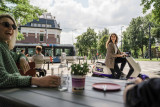
Deelscooteraanbieder Check introduceert vandaag een veiligheidsslot in haar app: de Safety Lock. De Safety Lock is ontworpen in afstemming met jongerenorganisatie TeamAlert. Met het slot kunnen gebruikers de eigen Check app tijdelijk blokkeren voor het reserveren van voertuigen. Op deze manier beschermt de gebruiker zichzelf tegen het (laagdrempelig) gebruik maken van scooters op een later tijdstip. Naast de Safety Lock introduceert Check ook een gerichte communicatiecampagne om gebruikers op relevante momenten te wijzen op de gevolgen van rijden onder invloed.
TeamAlert: ‘Actie nodig om dronken jongeren van deelscooter te houden’
In februari 2023 publiceerde TeamAlert, een organisatie die zich inzet voor de verkeersveiligheid van jongeren, een enquête waaruit blijkt dat ruim een kwart van de jonge deelscootergebruikers met een leeftijd tot en met 24 jaar wel eens onder invloed op een deelscooter stapt en de risico’s daarvan onderschat. De enquête was onder bijna duizend jongeren afgenomen. Naar aanleiding van het onderzoek riep TeamAlert gemeenten en deelscooteraanbieders op om in actie te komen en na te denken over oplossingen.
Deelscooteraanbieder Check introduceert de Safety Lock
Het onderzoek van TeamAlert, in combinatie met een landelijke toename van het gebruik van alcohol en drugs in het verkeer in 2022 (37,4% meer uitgedeelde boetes), is aanleiding geweest voor deelscooteraanbieder Check om in actie te komen. Op basis van meerdere gesprekken en feedbacksessies met deelscootergebruikers en verschillende autoriteiten op het gebied van verkeersveiligheid, waaronder TeamAlert, introduceert Check vandaag de Safety Lock. Met het slot kan elke gebruiker de eigen Check app tijdelijk blokkeren voor het reserveren van voertuigen. Op deze manier beschermt de gebruiker zichzelf tegen het (laagdrempelig) gebruik maken van scooters op een later tijdstip. Mochten gebruikers het slot toch willen deactiveren, omdat ze bijvoorbeeld niet onder invloed zijn, dan moeten ze eerst verplicht één minuut lang een tutorial over de gevolgen van rijden onder invloed bekijken. Gebruikers die het slot activeren worden gestimuleerd om hun Safety Lock te delen met vrienden om uit te dragen dat onder invloed zijn en rijden, niet samen gaat.
De Safety Lock helpt de gebruiker bij het maken van de juiste keuze
Saar Hadders, gedragsonderzoeker bij TeamAlert, legt uit hoe de Safety Lock gebruikers in staat stelt om de juiste keuzes te maken: “Onder sommige gebruikers geldt een sociale norm dat het rijden onder invloed op een deelscooter normaal is. Door het bedenken van een nieuwe feature om rijden onder invloed op deelscooters tegen te gaan, zendt Check een krachtige boodschap uit dat dit gedrag niet oké is. In de omgeving van jongeren zijn vrienden erg belangrijk in het creëren van een veilige sociale norm. Doordat de Safety Lock gebruikers stimuleert om de feature met hun vrienden te delen, wordt deze sociale norm versterkt.”
Hadders: “Jongeren hebben niet altijd de intentie om na een avondje stappen onder invloed te gaan rijden, maar door een combinatie van impulsiviteit en het effect van alcohol kan deze intentie vervagen. De Safety Lock biedt jongeren de mogelijkheid om zichzelf vóórdat ze hun eerste drankje drinken, te behoeden voor een onveilige rit naar huis. Wanneer gebruikers in de loop van de avond tóch van gedachten veranderen, deelt Check kennis over waarom het goed is om nuchter te rijden. Deze kennis kan helpen om alsnog het veilige gedrag te vertonen en ander vervoer te kiezen.”
De Safety Lock wordt versterkt door gerichte en relevante communicatie
Check heeft de communicatie om rijden onder invloed tegen te gaan opgedeeld in drie tijdvakken. De tijdvakken zijn gebaseerd op onderzoek van het SWOV. Afhankelijk van het tijdvak worden gebruikers aangemoedigd tot verantwoordelijk gedrag in het verkeer, bijvoorbeeld door gebruikers voorafgaand aan een avondje uit te attenderen op de mogelijkheid om het Safety Lock te activeren. Gebruikers die vrijdag- of zaterdagnacht tussen 23.00 uur en 06.00 uur een deelscooter willen pakken moeten eerst verplicht een tutorial kijken over de gevolgen van rijden onder invloed.
1. 'Self-driving' cars: a dream and a nightmare scenario (1/8)
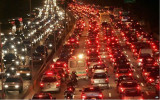
How far are we from large-scale use of 'self-driving' cars. This and subsequent posts deal with this question. In answering it, I will focus on the potential contribution of self-driving cars to the quality of the living environment. Nowadays, the development of self-driving cars has faded a bit into the background. There is a reason for that, and I will get to it later.
When 'self-driving' vehicles first emerged, many believed that a new urban utopia was within reach. This would save millions of lives and contribute to a more livable environment. However, it is only one of the scenarios. Dan Sperling writes: The dream scenario could yield enormous public and private benefits, including greater freedom of choice, greater affordability and accessibility, and healthier, more livable cities, along with reduced greenhouse gas emissions. The nightmare scenario could lead to even further urban expansion, energy consumption, greenhouse gas emissions and unhealthy cities and people.
The dream scenario
Do you have to go somewhere? On request, a self-driving car will stop in front of your door within a few minutes to make the desired journey. After you have been safely dropped, the car drives to the next destination. Until a few years ago, companies like Uber and Lync were looking forward to the day when they could fire all their drivers and offer their services with 'self-driving' cars. Naturally at lower prices, which would multiply their customer base. In this scenario, no one wants to have their own car anymore, right? The number of road casualties also will reduce drastically in this scenario. Autonomous cars do not drink, do not drive too fast, never get tired and anticipate unexpected actions of other road users much faster than human drivers. At least that was the argument.
Quick calculations by the proponents of this scenario show that the number of cars needed for passenger transport could decrease by a factor of 20 (!).
The nightmare scenario
This calculation was perhaps a little too fast: Its validity depends on a perfect distribution of all trips over day and night and over the urban space and on the presence of other road users. What you don't want to think about is that outside rush hour, most of the fleet of 'self-driving' cars is stationary somewhere or driving aimlessly in circles. Moreover, the dream scenario assumes that no one switches from public transport, walking, or cycling. Instead of improving cities, these types of cars have the potential to ruin them even further, according to Robin Chase, co-founder of Zipcar. Taxis, especially those from Uber and Lyft, are already contributing to traffic jams in major American cities and to the erosion of public transportation
Both views are based on suspicions, expectations, and extrapolations and a dose of 'wishful thinking' too. In the next posts, I will discuss results of scientific research that allows to form a more informed opinion about both scenarios.
Dit you already visit my new website 'Expeditie Muziek'. This week an exploration of world-class singer-songwriter 'Shania Twain
6th Cassini Hackathon in Amersfoort

The CASSINI Hackathons take place simultaneously in 11 different countries. The 6th edition is scheduled for November 3-5, with events happening both in Amersfoort and online in the Netherlands. In Amersfoort, this exceptional event is co-organized by dotSPACE foundation and Royal Haskoning DHV.
The 6th edition of the hackathon revolves around three key themes:
- <strong>Supporting sustainable infrastructure development.</strong> A strong national infrastructure facilitates critical services, promotes opportunities, and stimulates economic growth. Can you create a solution that supports the development of renewable energy, transport and mobility, or connectivity infrastructure?
- Strengthening food security and access to clean water. Tackling the urgent global issues rooted in the scarcity of food and clean water, we’re challenging participants to explore how space technologies can be better prepared for humanitarian crises and more effectively manage precious resources.
- Understanding and forecasting forced migration. In this challenge, we’re looking for solutions that will help authorities to predict population movements from vulnerable areas. How can space data help us manage logistics, resources, and transportation during difficult times?
Who Can Participate?
The CASSINI Hackathon is open to students, entrepreneurs, engineers, designers, researchers, and anyone interested in space technologies, international development, and humanitarian activities. To participate, you must be 18 or older and reside in an EU Member State, Norway, Switzerland, or Iceland. Teams should consist of at least 3 members and can have a maximum of 8.
For your convenience, we’ve arranged accommodations for on-site participants at the Stayokay Hostel in Soest.
GEMINI: Greening European Mobility through cascading innovation INItiatives
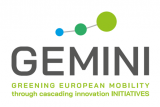
Context
At the heart of the GEMINI Project lies a commitment to fostering innovation and to accelerate the transition towards climate neutrality in mobility solutions.
Goal 11 of the UN Sustainable Development Goals advocates for access to safe, affordable, and sustainable transport systems. Nowadays, transport plays a significant role on air pollution and is one of the major sources of greenhouse gas emissions and is the only sector in the EU with increased Green House Gas (GHG) emissions compared to 1990.
The promotion of sustainable and innovative mobility solutions can help towards reducing GHG and carbon footprints, improving air quality, and achieving climate goals.
Project brief
The GEMINI Project (2023-2026 “Greening European Mobility through cascading innovation Initiatives” is a Horizon Europe funded project with 43 partners led by the Urban Electric Mobility Initiative (UEMI).
To accelerate the transition towards climate neutrality, GEMINI aims to foster widespread adoption of sustainable shared mobility solutions. To achieve this, the project will develop and test innovative business models for New Mobility Services (NMS) such as shared connected automated vehicles and shared mobility public transport through public-private partnerships. The NMS business models will be demonstrated in ten European Cities (Amsterdam, Copenhagen, Helsinki, Munich, Leuven, Ljubljana, Paris-Saclay, Porto and Turin).
Additionally, GEMINI will create digital tools and platforms that accommodate various mobility services, promoting collaboration and integration within the mobility sector. The project will actively engage stakeholders in the co-creation process, introducing Mobility as a Commons (MaaC) and incentivizing behavioural shifts and user acceptance of these new mobility options.
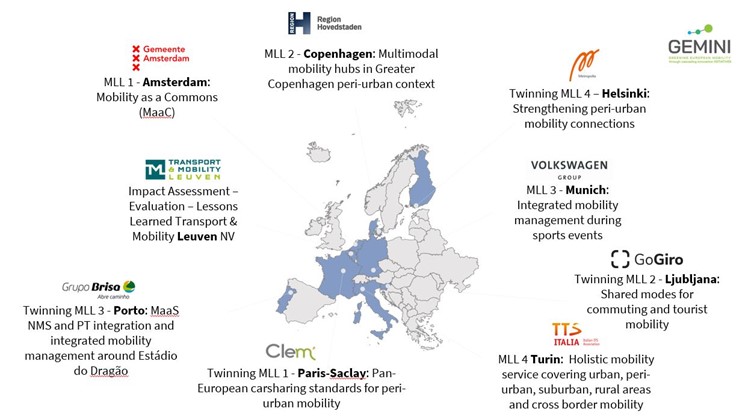
Furthermore, GEMINI will formulate policy recommendations to enable the scaling up and replication of successful mobility solutions. By aligning with Sustainable Urban Mobility Plans (SUMPs) and urban mobility planning frameworks, the project aims to contribute to a comprehensive policy package that guides and incentivizes future mobility innovations. The GEMINI project envisions fostering sustainable, accessible, and affordable shared mobility solutions that contribute to a safer and more environmentally friendly urban mobility landscape.
Objectives
- Develop and test sustainable business models for New Mobility Services (NMS) to increase shared mobility solutions (MaaS and MaaC) for various user groups, including enterprises, families, and tourists.
- Create digital enablers, including collaboration platforms and multimodal MaaS solutions, to integrate and facilitate a wide range of mobility services.
- Actively involve stakeholders in the co-creation of new mobility options and integrate Social Innovation practices to incentivize behavioural changes and user acceptance.
- Formulate policy recommendations to support the scaling up and replicability of successful mobility solutions, contributing to the development and implementation of SUMPs and urban mobility planning frameworks.
Cenex NL key contributions
The team plays a vital role in developing policy recommendations and technology roadmaps to accelerate the deployment of innovative mobility services. Through collaboration with local authorities in twinning cities, these roadmaps will align with the fast-track deployment of shared mobility trends in the short and medium term. Additionally, Cenex NL will contribute to the development of the Handbook consolidating the project’s learnings and offering practical guidance to cities and citizens across Europe.
This project has received funding from the European Union’s Horizon Europe research and innovation programme under grant agreement No 101103801.
Evenement: Unesco Werelderfgoed & Klimaat
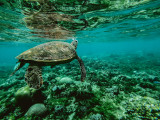
Werelderfgoed & Klimaat
Ook wel eens gedroomd van zwemmen met schildpadden op de Galápagoseilanden? Of van een tripje naar Yellowstone? Overal in de wereld is prachtig Werelderfgoed te zien, maar reizen daarnaartoe heeft een keerzijde. De klimaatcrisis zorgt ervoor dat ook Werelderfgoed het steeds lastiger te verduren krijgt. Kijk bijvoorbeeld naar het unieke en onvervangbare Great Barrier Reef in Australië waarvan de toekomst onzeker is. En het is maar de vraag of je over dertig jaar nog droge voeten houdt tijdens een vakantie in Venetië.
Praat mee op 28 september 2023 met onder andere klimaatambassadeur Kiki Boreel en spoken word-artiest Zaïre Krieger over het klimaat en Unesco Werelderfgoed. We gaan het hebben over hoe we bijzondere plekken in de wereld kunnen beschermen tegen klimaatverandering en hoe jij zelf in actie kunt komen. Zo hopen we samen tot een oplossing te komen zodat we door middel van duurzaam reizen nog steeds de mooiste plekken van de wereld kunnen bezoeken.
Over Unesco Werelderfgoed
NEMO organiseert deze bijeenkomst in samenwerking met de Unesco Jongerencommissie, de Nederlandse Unesco Commissie en Stichting Werelderfgoed. De organisaties zetten zich onder meer gezamenlijk in om Werelderfgoed te beschermen en te behouden.
Programma
- Korte pitches door Ginger Weerheim (Nederlands Bureau voor Toerisme en Congressen) en Tom van Nouhuys (Forteiland Pampus).
- Spoken word door Zaïre Krieger.
- Panelgesprek door Ginger, Tom, Emmeline van der Leen (Jonge Klimaatbeweging) en Annemieke Visser (Tienskip).
- Tips voor duurzaam toerisme door de Unesco Jongerencommissie, over wat jij zelf kan doen.
Praktisch
Voor een bezoek aan dit evenement in De Studio reserveer je een apart ticket.
- Toegangsprijs regulier: € 7,50
- Toegangsprijs met CJP pas, college- of studentenkaart: € 3,75
Tickets zijn inclusief een bezoek aan de tentoonstelling Energy Junkies én een gratis drankje.
*De Studio van NEMO is een extra locatie van NEMO Science Museum op het Marineterrein in Amsterdam. De programmering is speciaal voor volwassenen.
foto: Belle Co op Pexels
Green Innovation Hub Contest 2023!
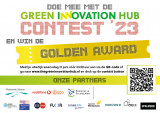
Green Innovation Hub Contest 2023! "Pitch voor Impact"
In Flevoland en Almere worden de komende jaren 130.000 nieuwe woningen gebouwd. De grootste bouwopgave van Nederland! Heb jij een innovatief product of dienst waarmee jij kunt bijdragen aan duurzame en inclusieve leefomgeving. En impact kunt maken op deze regio én de rest van Nederland. Doe dan mee met de Green Innovation Hub Contest 2023 en win de Golden Award.
🏆 Een trip naar Smart City Expo 2023 in Barcelona, coaching door expert, gratis office space, ondersteuning bij businesscases en modellen door partners, V.I.P.-tickets voor Ziggo Dome concert naar keuze en nog veel meer prijzen.
Hoe werkt het?
1️⃣ Doe mee en maak impact met jouw product of dienst.
2️⃣ Meld je uiterlijk woensdag 21 juni vóór 23.59 uur via de onderstaande link.
3️⃣ Op donderdag 22 juni maakt de jury bekend welke start-ups
en scale-ups mogen pitchen.
4️⃣ Mag je pitchen, dan nemen wij contact met je op zodat jij
jouw pitch goed kunt voorbereiden.
5️⃣ Woensdag 5 juli is de Green Innovation Hub Contest Day
waarbij je mag pitchen!
Wil jij deelnemen aan de contest of ben je geïnteresseerd om naar de pitches te kijken? Meld je dan nu aan via de onderstaande link.
Check straft foutparkeerders deelscooter af met blokkade account
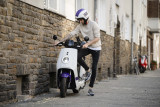
Om overlast van foutgeparkeerde deelscooters in de openbare ruimte te verminderen, introduceert deelvervoeraanbieder Check vandaag de Parkeerscore. Dit is een nieuwe functionaliteit in de app, waarmee gebruikers van deelscooters inzicht krijgen en afgerekend worden op hun parkeergedrag.
De parkeerscore
De Parkeerscore wordt getoond in de app van alle gebruikers. Voorafgaand aan een rit op een deelscooter van Check, beoordeelt een gebruiker hoe de scooter geparkeerd staat: duimpje omhoog of duimpje omlaag. Deze beoordeling wordt toegevoegd aan het profiel van de vorige gebruiker van de desbetreffende scooter. Alle beoordelingen over een gebruiker samen vormen de individuele Parkeerscore.
Op basis van de score krijgt een gebruiker de classificatie Uitstekend, Kan beter of Niet goed. Met de classificatie Kan beter neemt een gebruiker automatisch deel aan informatiecampagnes over netjes parkeren. Als er hierdoor geen verbetering optreedt in het parkeergedrag zakt de Parkeerscore naar Niet goed. Bij Niet goed moet de gebruiker verplicht aan het einde van elke rit een foto van de geparkeerde scooter maken die vervolgens wordt gecontroleerd door Check. Als dan nog steeds blijkt dat de gebruiker het parkeergedrag niet verbetert, wordt de gebruiker tijdelijk geblokkeerd op het platform.
Alternatief voor de auto
Paul van Merrienboer, mede-oprichter van Check, vertelt: “We maken met onze scooters gebruik van de publieke ruimte, dus we willen daar ook onze verantwoordelijkheid pakken met het voorkomen van verrommeling. Daarnaast willen we dat er ruimte ontstaat in het publieke debat om het échte probleem onder de loep te nemen: de enorme hoeveelheid ruimte die privéauto's in onze steden innemen in de openbare ruimte en in het verkeer.”
Daarom introduceert Check vandaag deze maatregel om de ervaren overlast verder omlaag te brengen. Van Merrienboer: “Onze data laat zien dat er in slechts 0,2% van de ritten overlast wordt gemeld. In 99,8% van de ritten gaat het dus al goed. Met deze nieuwe maatregel zijn we vastberaden om het aantal klachten nog verder omlaag te brengen.”
Effectieve oplossing
Het bedrijf weet uit ervaring dat slechts een kleine groep wanparkeerders verantwoordelijk is voor de overlast en dat het verzamelen van data over parkeergedrag een effectieve manier is om deze wanparkeerders te weren. Check heeft tot op heden meer dan drieduizend gebruikers geblokkeerd als gevolg van overlastmeldingen.
Ontmoet Beep for Help, een Amsterdamse sociale startup die ouderen en mantelzorgers hulp aan huis biedt.

Ontmoet Beep for Help, een Amsterdamse sociale startup die ouderen en mantelzorgers hulp aan huis biedt.
Ontdek hoe het idee ontstond, leer meer over digitale marketing en social media en discussieer mee over bedrijfscultuur. Ook vertelt Iconica, onze app ontwikkelaar, over de Beep for Help app.
Ondertussen zorgen wij voor fris en lekkere pizza en is er ruim gelegenheid om bij te praten met diverse mensen uit het veld. Fijn als je ook komt!
De inloop is vrij. Reserveren is fijn, dan weten we hoeveel pizza we verzorgen. Reserveren kan met onderstaande link of mail annebet@beepforhelp.nl
Wanneer: 07/06/2023
Tijd: 17:30
Locatie: Apollolaan 151
Demoday #19: Mobility as a Commons worksession
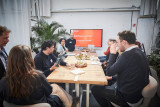
In the coming decades, urban population growth and a rising demand for mobility options will cause strain on our public spaces. The city of Amsterdam will counteract this trend by making private car ownership less attractive for its citizens, while making sure there are enough, well facilitated, alternative modes of transport. One could think of investments in (more) public transport, and the welcoming of shared mobility providers. Currently, some market players are making use of the latter and sharing cars and sharing mopeds are becoming part of the streetscape. Is this enough?
Mobility as a Commons
On the 23th of March, Diederik Basta and Jop Pék from the municipality of Amsterdam’s innovation department, hosted a working session on the concept of; Mobility as a Commons (MaaC). They introduced this concept by pointing out that currently, we’re not ‘sharing’ our modes of transport but we’re just ‘renting’ them from private companies. This raises a couple of concerns; these parties exist purely to maximize profits, they own and sell user data, their fleet of vehicles is not spread evenly throughout the city, and because it’s only available for those who can afford the service, it’s not inclusive for all.
The municipality is now exploring how to move away from these market mechanisms and facilitate car sharing solutions based in local ownership. This summer, they’ll experiment with pilots in which modes of transport are perceived as a ‘Commons’ and cooperatively owned and used by a group of local residents. Their goal is to gather insights on how to facilitate this form of locally organized mobility in the best way possible and pave the way for emerging initiatives.
Paradigm shifts
For this new alternative to succeed, drastic innovation is needed in which public authorities identify and alter their role. That’s why Diederik and Jop are also turning inwards and critically reflecting on the current premises from which they’re acting. Only then, you’ll be able to innovate in a way that you’re breaking free from your current paradigm and its effects. Because they are of such importance, I would like to quickly summarize the three relevant premises:
- People act out of self-interest; we assume mistrust. People need control and governance to reinforce the common good. Its effects: A government mistrusting its citizens and legal sealing of documents and procedures.
- The municipality owns public space. Public space should be designed and managed by experts to ensure quality, consistency and efficiency of functionalities. Its effects: Struggles with public participation and a focus on efficiency and functionality, instead of social interaction.
- The municipality is responsible for a well-functioning mobility system. Public space makes way, and more urban mobility makes people richer and happier. Its effects: Private parties push the mobility system and the government facilitates this, and traveling for work and other (social) activities is the norm.
Reactions from the participants
Next to inspiring the working session participants, Diederik and Job wanted to ignite an active conversation with the diverse group in front of them. They wanted to show the parties at the table how important it is to realise from what kind of premises and paradigm you’re currently ‘innovating’, but they were also curious what others thought of their upcoming project.
A big theme during the discussion was the fact that this ‘commons’ thinking is finding its way within different themes like the energy- and data transition. Energy cooperatives are emerging at a fast rate and this topic is receiving a lot of research and attention from energy companies at the moment. The same goes for cooperative ownership and use of data, as an alternative to protection and the commercial use of data. The different domains should be actively learning from each other, as learnings should be easily transferable. Furthermore, the group discussed the painful dilemma of the innovation department of the municipality. Their critical stance against their own policies is remarkable, but they need to find a balance where the pilot and its results will be refreshing and creative, as well as applicable in current policies as soon as possible. Finally, the group advised the presenters to; pay special attention to groups of citizens who have less time and resources available to organize themselves, write down in detail all administrative rules and obstructions that counteract these initiatives, and to not forget the power of private parties altogether; with a clear problem definition, they are able to organise and act at a fast rate.
What’s next?
In the coming months, the project’s final preparations and consideration will be implemented. Through the Horizon 2020 (GEMINI) project, The municipality of Amsterdam will cooperate with parties like Townmaking, Smart Innovation Norway, and our partner Cenex Nederland. Together they will guide and research local initiatives within Amsterdam (e.g. de Pijp, Tuindorp Oostzaan, Spaarndammerbuurt), activate a so called ‘Experimenteerregeling’ and create a plug and play system for future local initiatives. Diederik and Jop will incorporate the comments and discussions from this working session, and we’ll make sure to have them share their first learnings with the Amsterdam Smart City network later in 2023.
Do you want to know more about this topic, or would you like to get in contact with Diederik Basta or Jop Pék? You can contact me via pelle@amsterdamsmartcity.com, and I’ll connect you!
Stay up to date
Get notified about new updates, opportunities or events that match your interests.

